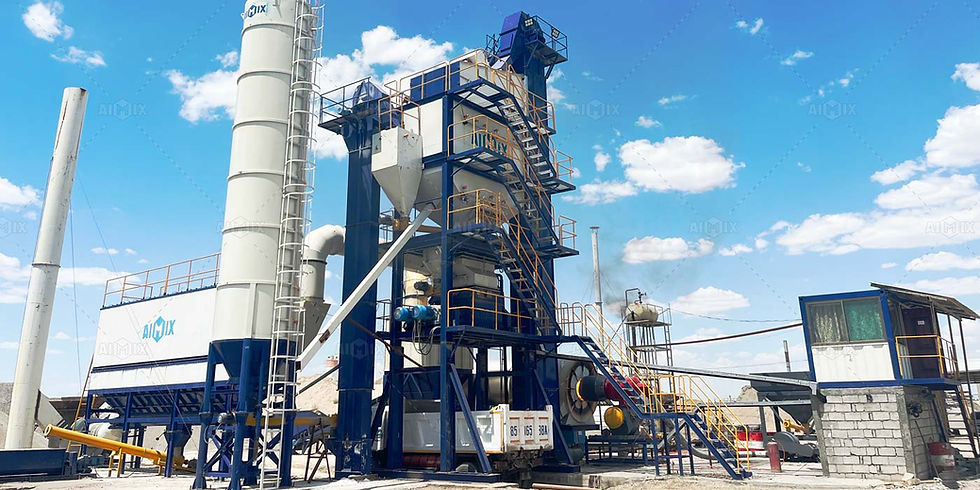The Role of Ready Mix Plants in Infrastructure Development
- aimixglobal5
- Sep 17, 2024
- 4 min read
In modern construction, ready mix plants play a pivotal role in driving infrastructure development. As cities grow and economies expand, the demand for large-scale infrastructure projects, such as roads, bridges, tunnels, airports, and high-rise buildings, continues to increase. Ready mix plants provide the essential concrete needed for these projects efficiently and reliably. In this article, we will explore how ready mix plants contribute to infrastructure development, highlighting their impact on project timelines, quality, and sustainability.
Efficiency in Concrete Production
One of the primary benefits of ready mix plants in infrastructure development is the ability to produce concrete at scale with remarkable efficiency. Unlike traditional on-site concrete batching, where concrete is mixed manually or in small batches, ready mix plants are capable of producing large quantities of concrete consistently.
Ready mix plants are automated, ensuring precise mixing of raw materials such as cement, water, aggregates, and additives. This automation reduces the likelihood of human error, resulting in uniform concrete mixes with accurate proportions. The consistency and quality of the concrete are critical for infrastructure projects, where durability and structural integrity are essential. Ready mix plants are designed to meet these high standards, producing large volumes of concrete on demand.
For infrastructure projects, where time is often a crucial factor, the speed at which ready mix plants can deliver concrete is a game-changer. This efficiency enables contractors to meet tight deadlines, helping projects stay on track and within budget.

Supporting Large-Scale Projects
Ready mix plants are especially beneficial for large-scale infrastructure projects that require continuous and high-volume concrete supply. Projects like highways, bridges, and dams need enormous amounts of concrete delivered to the construction site without interruption. The capacity of ready mix plants to produce and transport concrete in bulk ensures that these large-scale projects can proceed smoothly.
In large infrastructure projects, delays in material delivery can have significant consequences, leading to higher costs and extended timelines. Ready mix plants mitigate these risks by providing a reliable and consistent supply of concrete. By maintaining a steady flow of materials, ready mix plants help contractors avoid downtime and ensure that construction progresses according to schedule.
Enhanced Quality Control
In infrastructure development, the quality of concrete is paramount. Ready mix plants offer enhanced quality control measures that are difficult to achieve with traditional on-site mixing. Automated systems in ready mix plants allow for precise control over the mix design, ensuring the correct proportions of each ingredient. This level of precision is crucial for meeting specific project requirements, such as high-strength concrete for bridges or water-resistant concrete for tunnels.
Ready mix plants are also equipped with state-of-the-art testing equipment that continuously monitors the quality of the concrete being produced. This ensures that the concrete meets the necessary standards and specifications before it is delivered to the construction site. The ability to produce high-quality concrete consistently reduces the risk of structural failure and increases the lifespan of infrastructure.
Additionally, ready mix plants allow for the production of specialized concrete mixes, including high-performance concrete, fiber-reinforced concrete, and self-compacting concrete. These advanced concrete types are often required in complex infrastructure projects where traditional concrete may not be sufficient.

Improving Sustainability in Construction
Sustainability is becoming a key focus in the construction industry, and ready mix plants play an essential role in promoting eco-friendly practices. Infrastructure development projects, which often consume vast amounts of resources, benefit from the efficiency and waste reduction that ready mix plants offer.
Ready mix plants optimize the use of raw materials by precisely measuring the required quantities for each batch. This reduces waste and ensures that excess materials are not discarded. Additionally, many ready mix plants incorporate recycled materials into their concrete mixes, such as fly ash or slag, which not only lowers costs but also reduces the environmental impact of the production process.
Moreover, ready mix plants can reduce the carbon footprint of infrastructure projects by minimizing transportation distances. By strategically locating plants near construction sites, transportation-related emissions are lowered, and the use of fuel for delivery trucks is minimized. This makes ready mix plants a more sustainable option for large infrastructure projects compared to batching concrete on-site.
Streamlining Logistics and Reducing Costs
In large infrastructure projects, logistics can be a significant challenge. Coordinating the delivery of materials to the construction site can lead to delays and cost overruns if not managed efficiently. Ready mix plants simplify this process by centralizing concrete production and delivering the material directly to the construction site.
By utilizing ready mix plants, contractors can reduce the need for on-site storage of raw materials, which can be costly and space-consuming. Ready mix plants deliver concrete when and where it’s needed, streamlining the entire supply chain and minimizing the risk of supply disruptions.
Additionally, ready mix plants contribute to cost savings. The economies of scale provided by these reliable concrete plants allow for more competitive pricing of concrete, especially in large quantities. This can lead to substantial cost reductions in infrastructure projects, making them more financially viable.

Meeting Growing Infrastructure Demands
As urbanization accelerates, the need for infrastructure development grows. Ready mix plants are well-positioned to meet these demands by providing the necessary materials for large and complex projects. Whether it’s expanding transportation networks, building new energy facilities, or constructing flood control systems, ready mix plants ensure that the concrete supply is both reliable and adaptable to the evolving needs of modern infrastructure.
Ready mix plants are indispensable to infrastructure development due to their efficiency, high-quality production, sustainability benefits, and logistical advantages. Their ability to produce large quantities of high-quality concrete on demand ensures that infrastructure projects can proceed smoothly and on schedule. As cities continue to grow and infrastructure demands increase, ready mix plants will remain at the forefront of construction innovation, contributing to the development of stronger, more sustainable, and efficient infrastructure.







Comments